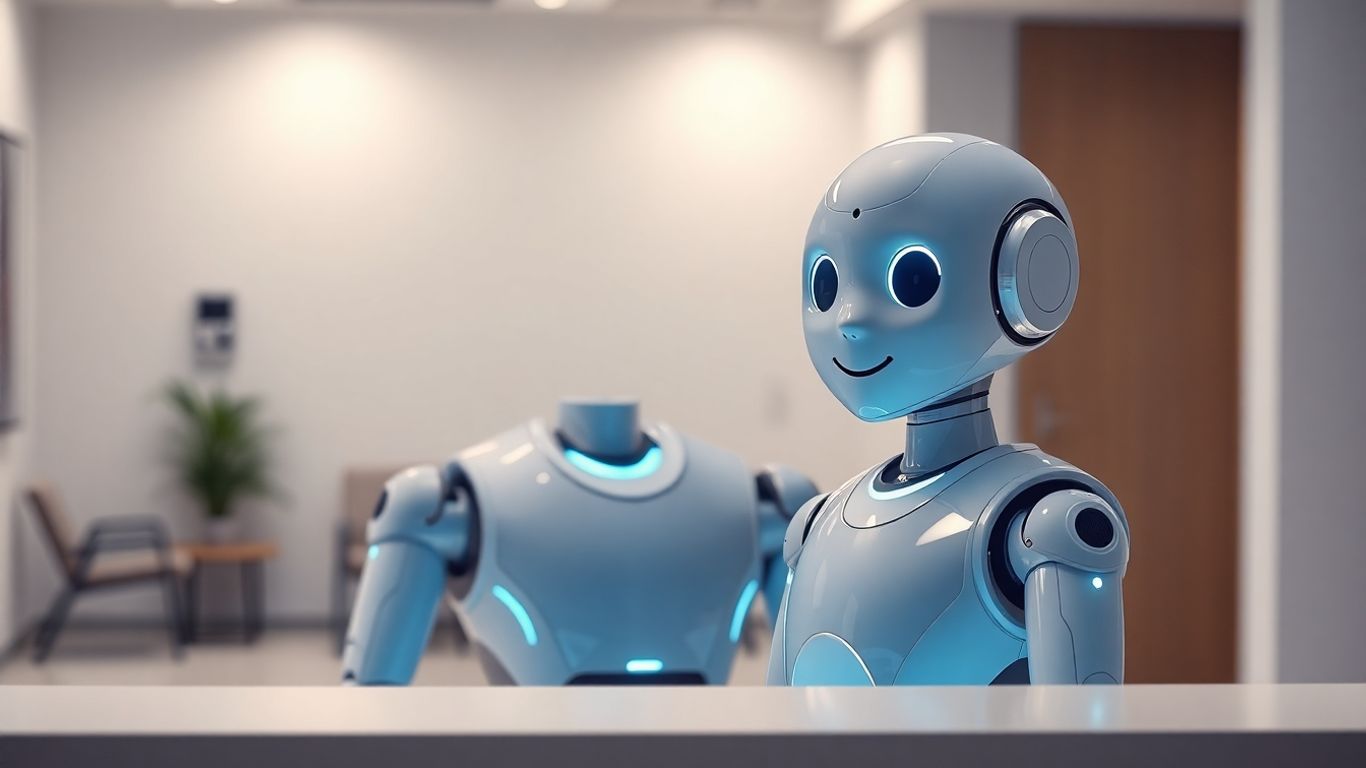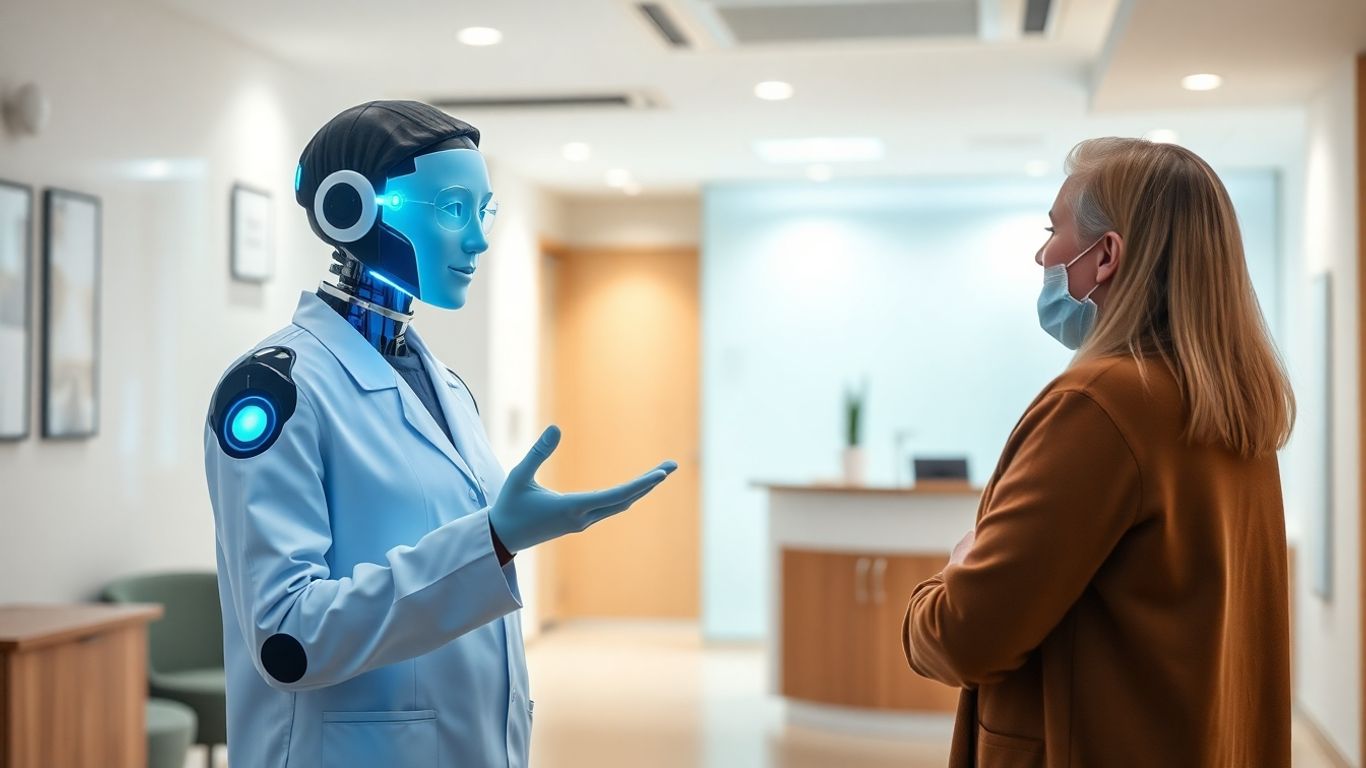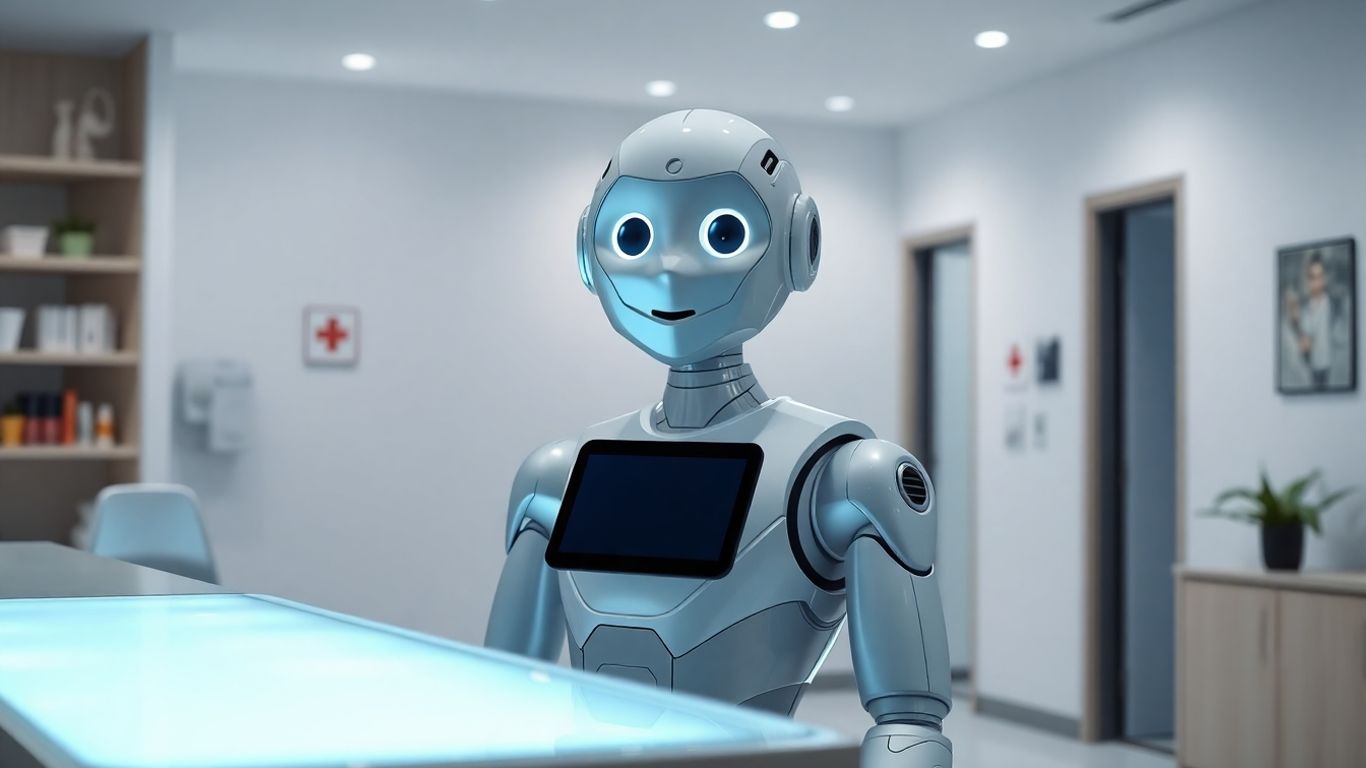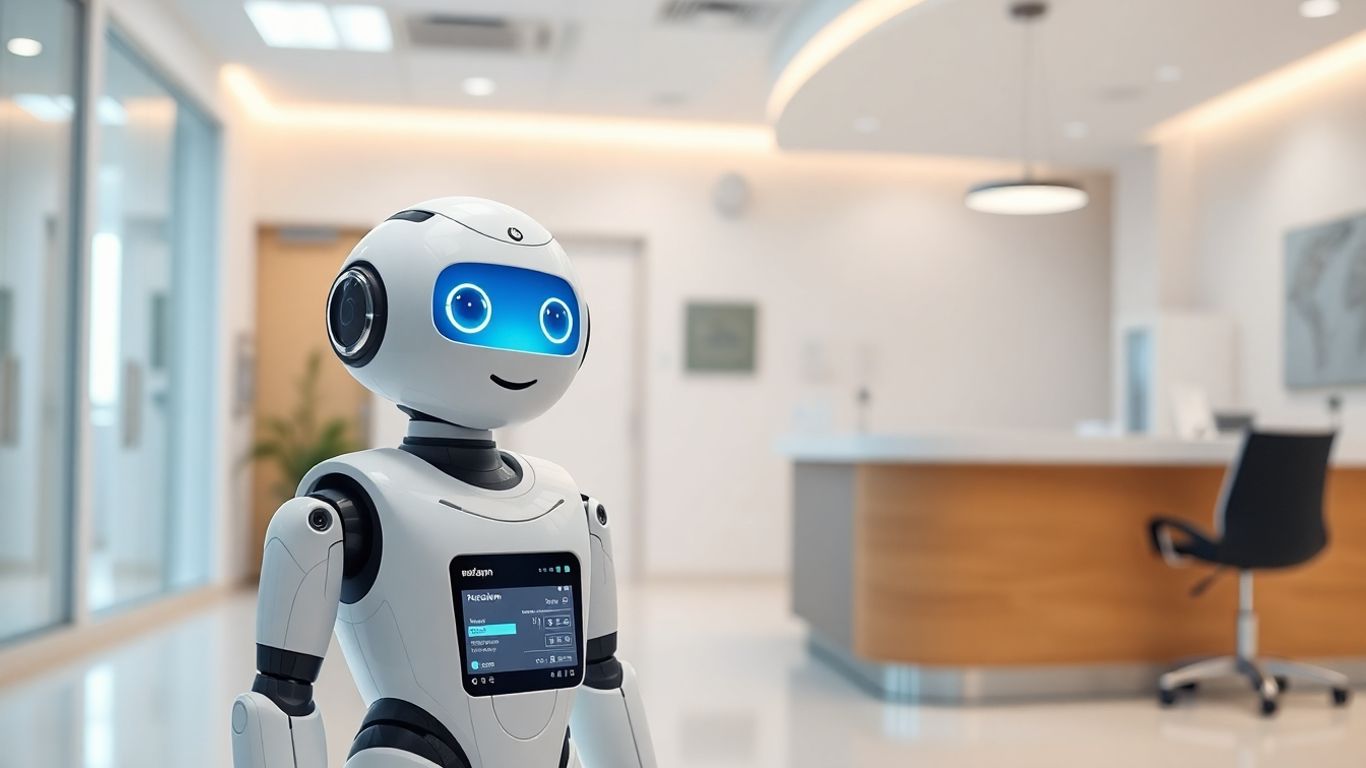Running a medical office means juggling a lot, especially at the front desk. It’s a busy spot, and sometimes, things just get missed. That’s where an ai receptionist for medical office comes in. Think of it like a super-efficient helper that’s always on, ready to answer calls, book appointments, and generally keep things running smoothly. It’s not about replacing people, but about making sure patients get the attention they need, when they need it, without overwhelming your staff. Let’s break down how this tech can really help your practice.
Let's be honest, the front desk of a medical office can get pretty hectic. It's the first point of contact for patients, and a lot of important stuff happens there – scheduling, answering questions, managing paperwork. Traditionally, this has all been handled by a human receptionist. But what happens when that person is swamped with calls, needs a break, or is out sick? Calls get missed, patients get frustrated, and things can get chaotic. That's where AI comes in. Think of an AI receptionist not as a replacement, but as a super-powered assistant for your front desk. It's designed to handle a lot of those routine tasks, freeing up your human staff to focus on more complex patient needs or direct care. It's about making sure no patient inquiry falls through the cracks, no matter the time of day.
Remember waiting on hold forever, listening to elevator music? Or maybe leaving a voicemail and hoping someone calls back? Those days are starting to fade thanks to AI. An AI receptionist can answer calls instantly, understand what the patient needs, and either provide information directly or schedule an appointment. It's like having a virtual assistant who's always available and never gets tired. This means patients can get answers to common questions, book appointments, or even get directions without having to wait for office hours or speak to a person. It really changes how people interact with your practice, making it smoother and more convenient for them.
It might sound like science fiction, but AI receptionists are already here and making a real difference in medical offices. They're not just a fancy gadget; they're a practical tool that helps streamline operations and improve the patient experience. By automating tasks like appointment booking and answering frequently asked questions, AI allows your practice to run more efficiently. This isn't about replacing the human touch in healthcare, but about using technology to support it, making sure that administrative tasks don't get in the way of providing great patient care. It's a glimpse into how healthcare administration is evolving, becoming smarter and more patient-focused.
Think about it: how many times has a patient tried to reach your office after hours, only to get a voicemail or a busy signal? It’s frustrating for them, and it means a missed opportunity for you. With an AI receptionist, that problem just… disappears. This system is always on, ready to pick up the phone or respond to a message any time of day or night. It doesn't need sleep, doesn't take breaks, and never gets overwhelmed. So, whether it's a late-night question about medication or an early-morning request to book an appointment, the AI is there. This constant availability means patients feel heard and cared for, even when your human staff isn't physically present. It builds trust and shows you're a practice that prioritizes patient needs, no matter the hour.
Patients often try to schedule appointments when it's convenient for them, which isn't always during your standard business hours. An AI receptionist can handle this smoothly. It can access your clinic's schedule in real-time, find available slots, and book appointments without any human intervention. Imagine a patient needing to see a doctor on a Saturday morning. Instead of waiting until Monday to call, they can interact with the AI receptionist on Friday evening and secure their appointment right then and there. This not only makes booking easier for the patient but also helps fill your schedule more efficiently, reducing those awkward gaps that can happen when relying solely on office hours for scheduling.
Nobody likes being put on hold. Waiting for a callback can feel like an eternity, especially when you have a simple question. An AI receptionist can answer frequently asked questions instantly. Think about things like:
The AI can be trained on all this information and provide accurate answers in seconds. This frees up your human staff to handle more complex patient needs and reduces the overall wait time for everyone. It creates a more efficient and less stressful communication flow for both your patients and your team.

Running a medical office means juggling a million things, and the front desk is often the busiest spot. That's where an AI medical receptionist really steps in to help. It's not about replacing your human staff, but giving them a hand so things run smoother, especially with all those routine tasks that eat up so much time.
Think about how many times a day your front desk staff has to book, reschedule, or cancel appointments. It's a constant back-and-forth. An AI receptionist can handle this automatically. It checks the doctor's schedule, finds available slots, and books appointments directly. It can even send out confirmations and reminders, which helps a lot with keeping the schedule full.
No-shows are a big headache for any medical practice. They mean lost revenue and disrupted schedules. An AI receptionist can significantly cut down on these by sending out timely and personalized reminders. These aren't just generic messages; they can be tailored to the patient and the appointment type. This proactive approach makes patients more likely to remember and attend their appointments.
The consistency of AI-driven reminders means fewer missed appointments, which directly impacts the practice's financial health and patient flow.
Getting new patients set up or updating existing patient information can be a lengthy process. An AI receptionist can gather necessary details before the patient even arrives. This includes collecting demographic information, insurance details, and even basic medical history through a secure, guided conversation. This means when a patient checks in, much of the paperwork is already done, speeding up the entire process and reducing the burden on your administrative team.
Switching to an AI receptionist for your medical office might sound like a big leap, but the benefits really start to add up, making it a smart move for many practices. It's not just about saving a few bucks; it's about fundamentally changing how your clinic operates for the better.
Let's talk numbers for a second. Hiring and training front desk staff can get expensive, especially with the usual turnover in these roles. Plus, you've got salaries, benefits, and the occasional overtime. An AI receptionist, on the other hand, works around the clock without needing breaks or sick days. This means you can potentially see a big drop in your operational expenses. Think about it:
While there's an initial investment, the long-term savings from reduced labor costs, fewer missed appointments due to better communication, and increased operational efficiency can be substantial. It's about reallocating resources where they matter most.
Your current reception staff are probably juggling a million things at once – answering phones, greeting patients, managing schedules, and dealing with paperwork. When an AI takes over many of these routine tasks, your human team can actually focus on what they do best: providing direct patient care and handling more complex, sensitive issues that require a human touch. This not only makes their jobs less stressful but also improves the quality of care patients receive.
As your medical practice grows, so does the volume of patient inquiries and appointments. Scaling up a human reception team can be slow and costly. An AI receptionist, however, can handle an almost unlimited number of calls simultaneously. Whether you have a sudden influx of new patients or experience peak call times, the AI can manage it all without missing a beat. This means your practice can grow without being held back by administrative bottlenecks, always ready to serve more patients efficiently.
It's tough to connect with everyone if you're only speaking one language. Think about it – your community probably has folks who speak Spanish, maybe Mandarin, or other languages. An AI receptionist can be programmed to chat in multiple languages. This means a patient who feels more comfortable speaking Spanish won't have to struggle through an English conversation. They can just talk in their native tongue, and the AI gets it. This makes them feel heard and respected, which is a big deal when they're already dealing with health stuff.
People these days communicate in all sorts of ways. Some still like a good old phone call, others prefer texting, and some might even use a chat feature on your website. An AI receptionist can handle all of these. It's not just about answering the phone; it's about being available where your patients are. If someone texts a question after hours, the AI can answer it. If they prefer to use the website chat, the AI is there too. This flexibility means fewer missed connections and happier patients who can reach you on their terms.
One of the best things about an AI is that it doesn't have bad days. It gives the same polite, helpful response every single time. This consistency is super important in healthcare. Patients get reliable information about appointments, directions, or what to bring to their visit, no matter when they ask or how they ask. It cuts down on mix-ups and makes sure everyone gets the right info, every time.
The goal here is to make interacting with your medical office as easy and stress-free as possible. When patients can communicate easily, in their preferred language and through their preferred method, they feel more connected and cared for. It's about removing barriers so they can focus on their health.
Here's a quick look at how different channels can be managed:
Running a medical office means juggling a million things at once. You've got patient care, staff management, billing, and a mountain of administrative tasks. It's easy for the front desk to become a bottleneck, especially during busy periods. That's where AI steps in, not to replace your human team, but to give them a serious helping hand.
When the phone rings, especially in a medical setting, you want to make sure the right person gets the call quickly. AI can do just that. It's smart enough to figure out if a call is urgent or routine and send it to the right place without delay. This means critical patient needs are addressed faster, and less urgent matters don't tie up staff who are busy with immediate patient care.
Imagine a scenario where a patient calls in distress, mentioning severe pain. An AI system can recognize these keywords and immediately flag the call for a nurse or doctor, bypassing the standard queue. This kind of rapid, intelligent routing can make a real difference.
Let's be honest, a lot of front desk work is repetitive. Scheduling appointments, sending reminders, collecting basic patient info – these tasks eat up valuable time. An AI receptionist can take over a huge chunk of this, freeing up your human staff for more complex, patient-facing duties.
Beyond just handling calls and appointments, AI systems are fantastic at collecting and analyzing data. This information can give you a clearer picture of how your office is running and where improvements can be made. You can see patterns in call volumes, common patient questions, and even identify peak times that might require more staff coverage.
This kind of data helps you make smarter decisions about staffing, resource allocation, and even patient communication strategies. It turns raw data into actionable steps for a smoother-running practice.

So, you're thinking about bringing an AI receptionist into your medical office. That's a big step, and honestly, it can feel a little overwhelming at first. There are a lot of options out there, and you want to make sure you pick the right one that actually helps, not hinders, your practice. It’s not just about plugging something in and hoping for the best; it requires a bit of thought.
When you're looking at AI receptionist tools, the first thing to really zero in on is whether it's built for healthcare. Generic AI might handle basic questions, but a healthcare-specific AI understands the nuances of medical appointments, patient privacy, and common medical inquiries. It's like hiring a receptionist who already knows the lingo versus someone who has to learn it all from scratch. Look for systems that are designed with medical offices in mind – they'll usually have features tailored to your specific needs.
This is a big one. Your AI receptionist needs to play nice with your existing systems, especially your Electronic Health Records (EHR). If the AI can't easily connect with your EHR, you're going to create more work, not less. You want it to be able to pull up patient info, schedule appointments directly into your system, and update records without a hitch. Think of it as the AI needing a direct line to your office's brain. A system that integrates smoothly means less manual data entry for your staff and fewer errors. It should feel like a natural extension of your current setup, not a clunky add-on.
This is non-negotiable. Patient data is sensitive, and you absolutely must protect it. Any AI receptionist you consider must be HIPAA compliant. This means it has the right safeguards in place to keep patient information private and secure. Don't be afraid to ask vendors directly about their security protocols and how they handle data. You need to be confident that your patients' information is safe. It’s about building trust, both with your patients and with the technology you implement. A data breach can be devastating, so this is one area where you really can't afford to cut corners.
Implementing an AI receptionist is more than just a tech upgrade; it's a strategic decision that impacts patient care and operational efficiency. Careful selection and integration are key to realizing its full potential.
Remember those old phone systems where you'd wait on hold forever, listening to terrible music? Yeah, nobody misses that. With AI receptionists, those days are pretty much over. These systems are built to be fast. We're talking responses measured in milliseconds, which is quick enough to keep up with a normal conversation. It’s like having a chat with someone who’s always paying attention and never needs a moment to think. This speed makes a big difference. It stops those frustrating moments where you feel like you're talking to a slow machine and makes the whole interaction feel more natural, more human, even though it's AI.
It's not just about speed, though. AI receptionists are getting really good at understanding what people are asking, even when it's not a simple question. They can process complex requests and pull up the right information without missing a beat. Think about it: a patient calls with a question about a specific procedure, their insurance, and a follow-up appointment all at once. An AI can sort through that, find the relevant details from your practice's information, and give a clear answer. This precision means fewer mistakes and more satisfied patients who get the information they need right away.
Latency, or that slight delay in communication, can really throw off a conversation. It makes things feel awkward and robotic. AI receptionists are designed to minimize this. They're built to respond almost instantly, creating a smooth back-and-forth that feels much more like talking to a person. This isn't just a small perk; it changes the whole experience. Instead of feeling like you're interacting with a system, patients feel heard and understood, which is a big win for any medical office trying to make people feel comfortable and cared for.

So, you're thinking about an AI receptionist for your medical office. That's smart. But how do you really get the most bang for your buck? It's all about understanding and using the specific features that make these systems so powerful. It’s not just about answering phones; it’s about smart control and flexibility.
Let's be real, budgets are a thing. You don't want surprise charges piling up. That's where setting limits comes in handy. You can actually put a cap on how many minutes your AI receptionist is active over a certain period – think daily, weekly, or monthly. This is great for managing expenses and making sure you don't go over budget. It also helps you see when your AI is getting the most use, which can tell you a lot about your patient traffic. If you hit your limit, you can set it up to forward calls to voicemail or a human staff member, so you never miss anything important.
This feature gives you a firm grip on your spending, preventing unexpected costs and allowing for predictable billing. It's about balancing accessibility with financial responsibility.
Time is a big deal in communication, right? A call at 9 AM is totally different from a call at 9 PM. An AI receptionist that understands this context is a game-changer. You can tell the system exactly when to be active – during your business hours, for instance. It can also adapt to holidays or specific seasons. This means patients get responses that make sense for the time of day or the specific occasion. No more getting an automated message at 2 PM on a Tuesday saying, "We're closed." It makes interactions feel more natural and less robotic, showing you respect your patients' time.
Remember the old days of busy signals? Yeah, those are pretty much gone with AI. This is where the "unlimited parallel calls" feature shines. Imagine your practice suddenly gets super busy – maybe a local news story mentions your clinic, or there's a sudden health concern in the community. Instead of a long queue of frustrated callers, your AI receptionist can handle all of them at once. It doesn't get overwhelmed. This means every patient gets attention, no matter how busy things get. It’s like having a whole team of receptionists working simultaneously, but it’s just one smart system. This keeps your patients happy and ensures your practice doesn't miss out on potential appointments or important inquiries, even during the busiest times. It’s a huge step up from traditional phone systems and really helps scale your practice without the usual growing pains.

Keeping patient records up-to-date is a huge part of running a medical office. AI can really help here. Instead of a human typing in every detail from a patient's visit or a phone call, AI can grab that information and put it right into the Electronic Health Record (EHR) system. This means fewer mistakes, like typos or missed information, which is super important when you're dealing with patient health data. It can automatically update things like patient demographics, insurance details, and even basic medical codes. This accuracy is key for everything from billing to making sure the right doctor has the right information.
Doctors and nurses spend a lot of time writing notes during patient appointments. It takes away from their focus on the patient. AI scribing tools can listen to the conversation between the doctor and patient and then create a draft of the medical notes. This draft can then be reviewed and edited by the healthcare provider. It's not about replacing the doctor's judgment, but about cutting down the time they spend on documentation. Think of it as a helpful assistant that captures the conversation so the doctor can concentrate on listening and diagnosing.
Let's be honest, paperwork is a drag. For medical offices, it's even more critical and time-consuming. AI can take over many of the repetitive tasks that used to require someone to manually input data. This includes things like filling out forms, updating patient histories, and even generating summaries of patient interactions. By automating these tasks, AI frees up the office staff to handle more complex patient needs or administrative duties that really require a human touch. It helps make the whole process smoother and less prone to errors that can happen when people are tired or overloaded with tasks.
The goal isn't to remove humans from the process, but to use AI to handle the parts that are tedious and error-prone, allowing medical professionals to focus on what they do best: patient care. This shift can lead to more efficient workflows and better overall patient outcomes.
AI is changing how doctors and nurses keep patient records. Instead of writing everything down by hand, computers can now help. This makes it faster and easier to find patient information. AI can even help write notes during appointments, like a virtual assistant. This means doctors can focus more on patients and less on paperwork. Want to see how AI can help your practice? Visit our website to learn more!
So, bringing an AI receptionist into your medical office isn't just about keeping up with the latest tech. It's about making things smoother for everyone. Patients get their questions answered faster, appointments are easier to book, and your staff can actually focus on what matters most – patient care. It’s like giving your front desk a super-powered assistant that works around the clock. While it might seem like a big change, the benefits in efficiency and patient happiness are pretty clear. It's a smart move for practices looking to improve how they operate and make patients feel more looked after.
Think of an AI receptionist as a super-smart computer program that can do many of the jobs a human receptionist does. It can answer phone calls, help patients set up appointments, and answer common questions about the clinic, all automatically. It's like having a virtual helper that works 24/7.
Yes, these AI systems are designed to understand what people say, even if they ask questions in different ways. They use advanced technology to figure out what the patient needs and find the right answer or action, just like a person would.
One of the biggest perks is that an AI receptionist never sleeps! It's available day and night, even on weekends and holidays. This means patients can book appointments or get answers to their questions whenever they need to, without having to wait for the office to open.
The AI can connect to the clinic's calendar and see when doctors are free. It can then offer available times to patients over the phone or through text, and book the appointment directly. It can also send reminders to help patients remember their appointments, which means fewer missed visits.
Most AI receptionist systems are pretty easy to set up. You usually just need to provide some basic information about your clinic, like your services and hours, and the AI can be ready to go in a short amount of time. It's designed to be user-friendly.
Many AI receptionists can talk to patients in more than one language. This is really helpful for clinics that have patients who speak different languages, making sure everyone can communicate easily and get the help they need.
While an AI receptionist can handle many tasks, it's programmed to recognize urgent situations. If a call sounds like an emergency, the AI can be set up to quickly connect the patient to the right medical professional or emergency service, ensuring they get help right away.
Not at all! An AI receptionist is meant to help human staff, not replace them. It takes care of the routine tasks, freeing up your team to focus on more important things like direct patient care, handling complex issues, or providing a personal touch where it's needed most.
Start your free trial for My AI Front Desk today, it takes minutes to setup!








